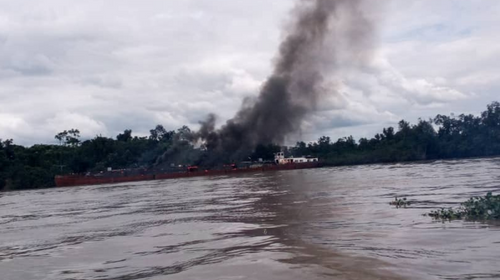An oil vessel that was apprehended carrying crude oil that had been stolen from the Escravos Pipeline was burned on Monday by the Nigerian National Petroleum Company Ltd. and the Security Agencies. Seven crew members were aboard the ship, MT Deinmo, which had the IMO number 7210526 when it was discovered last Thursday in the waterways of the Niger Delta. The vessel carrying the stolen crude was allegedly intercepted by Tantita Security Services employees working for the NNPC on pipeline monitoring (controlled by ex-militant commander Government Ekpemupolo, aka Tompolo).
They were caught stealing directly from Escravos Pipeline in Warri South West LGA, Delta state. Following the arrest, operatives of the Security Company were said to have handed over the vessel to the Nigerian Navy
Speaking with newsmen shortly before the vessel was set ablaze, the Marine Intelligence Consultant to Tantita Security Services, Warredi Enisuoh, said the vessel has been under investigation for a long time.
He said the vessel is about 87 metres long and has six cargo hole tanks made up of 12 compartments.
According to him, the ship is not designed as an ocean-going vessel, but a river vessel which was converted to be used in the ocean for illegal operation.
Enisuoh said, “I will say that the crew were quite smart, but they were not smarter than the country and the NNPC.
“So, what has happened is that it is among the lists of vessels being monitored constantly. It has been evading authorities for quite a while now and its route is very funny.
“It has been frequenting the Niger- Delta at the same time carrying crude illegally to Ghana, precisely Tema. That is the place where they normally go for discharge.”
He explained that an ambush was laid by security agencies for the ship which eventually yielded success on October 6. He stated that as soon as the crew on an illegal operation ferried into the ambush, they were arrested on the spot where they were pumping crude oil into their vessels.
“An ambush was laid for this particular vessel and it fell into it on the 6th of October. What happened is that it came in to load, and they brought the ship from Escravos side inside the creeks where they didn’t know we were waiting and we allowed them to connect the hoses from the Escravos pipeline and from there, they started pumping crude into it. They were taken by surprise.
“The line is a major line that goes to the Chevron Terminal. Actually, there are about five compartments that stored crude oil and the total quantity is about 650 cubic metres of crude oil separated into several compartments because they couldn’t finish the operation as a result of the arrival of Tantita Security, they abandoned their mission.
“They didn’t go into a Terminal, they went illegally into the Bush. The creek where criminals connect their hoses to the major line and start pumping the crude out of the credible line to an incredible ship. That was what happened”, he said.
On the identities of those arrested in the illegal operation, he said after their profiling, it was discovered that seven of them are Nigerians.
Enisuoh added, “So far, for this crude, there are seven of them and all of them are Nigerians by their names. The captain of the crew said they were hijacked, but by the documents, we have proved otherwise.
“According to the captain, he joined this ship actually two and half months ago, but records taken from this ship show that this ship was detained in Nigeria back in September 2021 and the documents also showed that the vessel was handed over and released and he was the captain on board at the time.
“He (captain) said this is the first time that he is on this ship. If it is the first time he is on this ship and the ship was detained with him on board in September 2021, then he has been here for more than a year.”
Speaking during an interview shortly after the destruction of the ship, Wunti said the rule of engagement has been strictly adhered to in carrying out the exercise.

